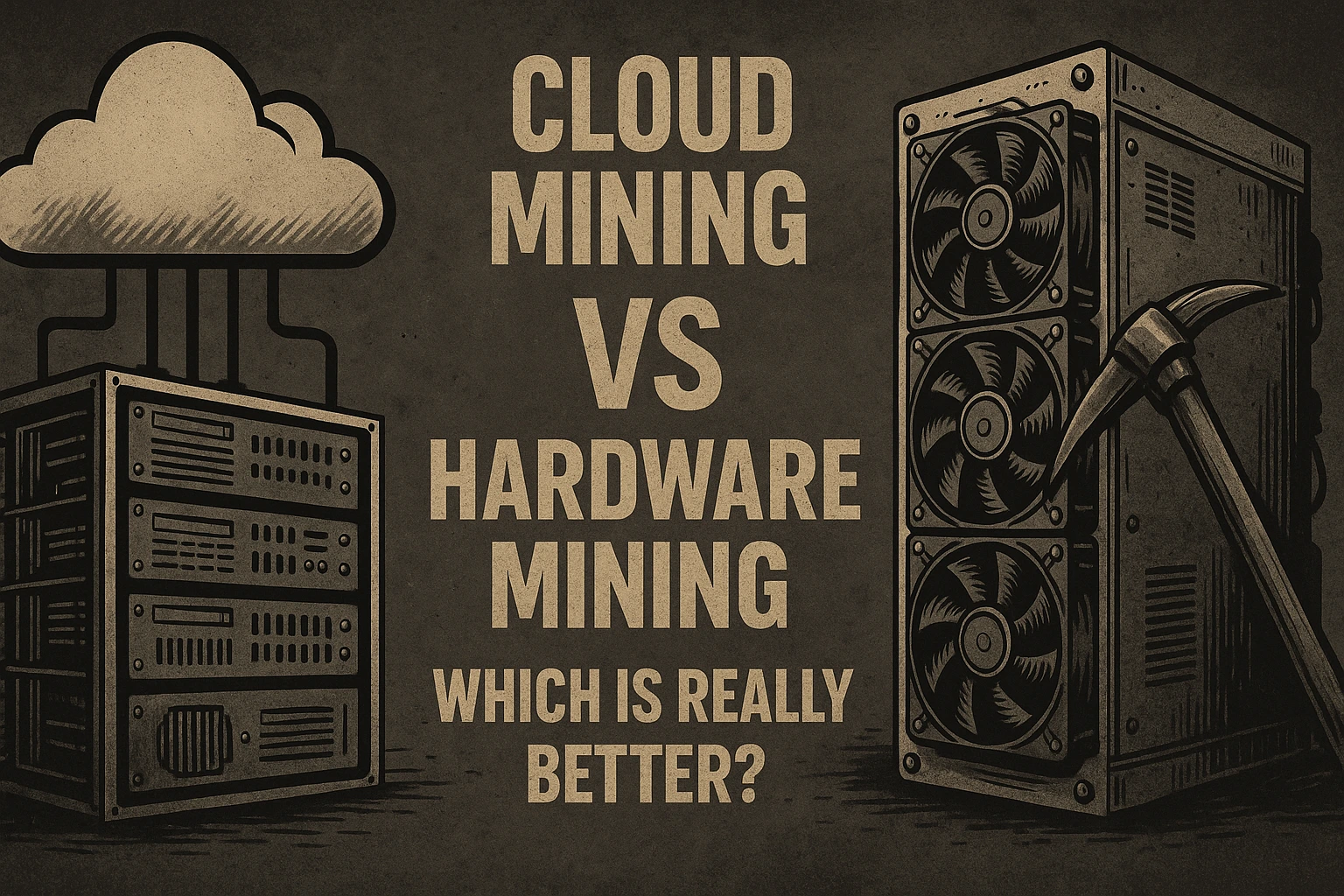Mining for cryptocurrencies has become a popular way for people to earn digital assets. But with so many options available, it can be difficult to know which approach to take. Cloud mining and hardware mining are two of the most common methods, but they differ significantly in their setup, costs, and potential rewards. In this article, we’ll explore the definitions and the purpose of cloud mining and hardware mining, and compare the two to help you determine which one might be right for you.
Cloud mining refers to the practice of renting out remote computing power from a data center to mine cryptocurrencies. This allows you to take advantage of the computing power of a large-scale operation without having to invest in hardware yourself.
Hardware mining, on the other hand, involves investing in physical mining equipment and running it yourself. This requires a significant upfront investment, but it also gives you more control over the mining process and can potentially lead to greater profits.
The purpose of this article is to provide an in-depth comparison of cloud mining and hardware mining. We’ll cover the pros and cons of each method, and help you understand the key differences between the two. Whether you’re new to cryptocurrency mining or an experienced miner, this article will give you the information you need to make an informed decision about which method is right for you.
Cloud mining is a type of cryptocurrency mining that allows you to rent computing power from a data center. Instead of investing in your own mining hardware and electricity, you pay a fee to a cloud mining company, which provides you with the computing power to mine cryptocurrency on your behalf. The mining company operates large-scale mining operations and provides you with a portion of the profits.
Advantages of Cloud Mining:
- No need for hardware: One of the biggest benefits of cloud mining is that it eliminates the need for you to purchase and maintain your own mining hardware. This can save you a significant amount of money, as mining equipment can be expensive to purchase and maintain.
- No electricity costs: Another advantage of cloud mining is that you don’t have to worry about electricity costs. The mining company is responsible for paying for the electricity needed to run the mining operations, so you don’t have to worry about paying for electricity costs out of your own pocket.
- No technical knowledge required: Cloud mining requires little technical knowledge, making it an attractive option for people who are new to cryptocurrency mining. The mining company takes care of all the technical details, so you can focus on earning profits without having to worry about the technical side of things.
Here are some examples of cloud mining companies that have received positive feedback from the cryptocurrency community:
- Genesis Mining
- Hashflare
- Hashing24
- IQ Mining
It’s important to note that the cryptocurrency industry is still relatively new and there have been many scams in the past, so it’s important to thoroughly research any cloud mining company before investing. Make sure to read reviews, check the company’s reputation and track record, and understand the risks involved before making a decision. Additionally, keep in mind that the profitability of cloud mining can be affected by a number of factors, including cryptocurrency prices and mining difficulty, so it’s important to consider these factors when making your decision.
Disadvantages of Cloud Mining
- Lack of control: One of the biggest disadvantages of cloud mining is that you have limited control over the mining operations. You are relying on the cloud mining company to operate the mining operations and provide you with a portion of the profits. This can make it difficult to optimize your mining operation for maximum profitability.
- Dependence on the provider: When you participate in cloud mining, you are completely dependent on the cloud mining company to provide you with the computing power to mine cryptocurrency. If the company experiences technical difficulties or fails to operate the mining operations effectively, it can negatively impact your profits.
- Potential for scams: Unfortunately, the cryptocurrency industry has seen a number of scams in the past, and cloud mining is no exception. Some cloud mining companies have been known to operate Ponzi schemes or simply take customers’ money without providing any mining services. It’s important to thoroughly research any cloud mining company before investing and make sure that it has a track record of operating honestly and effectively. Additionally, be wary of companies that promise guaranteed profits or offer returns that seem too good to be true.
Hardware Mining
Hardware mining is a method of cryptocurrency mining that involves investing in physical mining equipment. This equipment is used to perform the actual calculations needed to mine cryptocurrency, and it requires an initial investment in the hardware. Hardware mining requires technical knowledge and experience, as well as an understanding of the cryptocurrency mining process.
Advantages of Hardware Mining:
- Control over the hardware: When you invest in hardware mining, you have complete control over the mining equipment. This allows you to make decisions about how you want to run the equipment and optimize your mining operation for maximum profits.
- Potential for greater profits: Because you are in control of the hardware and can optimize it for maximum profitability, hardware mining has the potential to be more profitable than cloud mining. Additionally, you can also sell your hardware if you choose to stop mining, recouping some of your initial investment.
- Ability to sell hardware: If you no longer want to mine cryptocurrency, or if the profitability of mining decreases, you can sell your hardware to recoup some of your investment. This makes hardware mining a more flexible option than cloud mining, where you are locked into a contract with a cloud mining company.
Here are some examples of popular hardware mining equipment:
- Antminer
- Avalon:
- Innosilicon:
- Baikal
It’s important to note that the cryptocurrency mining industry is constantly evolving, and new hardware is constantly being developed. Before investing in hardware mining equipment, it’s important to research the latest technology and compare the different options available to determine which equipment is most suitable for your needs. Additionally, keep in mind that the profitability of hardware mining can be impacted by a number of factors, including cryptocurrency prices, mining difficulty, and electricity costs, so it’s important to carefully consider these factors before making a decision.
Disadvantages of Hardware Mining
- Initial investment costs: One of the biggest disadvantages of hardware mining is the initial investment required to purchase the mining equipment. The cost of mining equipment can be substantial, and it may take a while to recoup your investment and start seeing a profit. Additionally, the cost of electricity and other expenses associated with running the mining equipment can also add up over time.
- Technical knowledge required: Hardware mining requires a certain level of technical knowledge and experience, and it may not be suitable for everyone. You need to have a good understanding of the cryptocurrency mining process, as well as experience setting up and managing the hardware. If you don’t have the technical expertise, you may need to hire someone to help, which can add to your costs.
- Maintenance costs: Another disadvantage of hardware mining is the cost of maintaining the equipment. The mining hardware needs to be kept in good working order to be effective, and you may need to perform regular maintenance, repairs, or upgrades to keep the equipment running smoothly. These costs can add up over time and eat into your profits, so it’s important to carefully consider the costs involved before investing in hardware mining.
Cloud mining vs Hardware mining: Comparison
In this section, we will compare the key differences between Cloud Mining and Hardware Mining, including initial investment costs, operating costs, potential for profits, and control and flexibility. By comparing these key factors, we can gain a better understanding of the pros and cons of each method and determine which approach is best suited for our needs.
Initial investment costs
Cloud mining typically requires a smaller initial investment compared to hardware mining. With cloud mining, you only need to pay for the portion of the mining power that you use, and there is no need to purchase expensive hardware. On the other hand, hardware mining requires a substantial initial investment to purchase the mining equipment, and there may be additional costs associated with setting up the equipment and getting it running.
Operating costs
Operating costs can also be lower with cloud mining compared to hardware mining. With cloud mining, you don’t have to pay for electricity, maintenance, or other expenses associated with running the equipment. With hardware mining, you are responsible for all of these costs, which can add up over time and eat into your profits.
Potential for profits
The potential for profits can be higher with hardware mining compared to cloud mining. With hardware mining, you have complete control over the mining operation and can optimize it for maximum profitability. With cloud mining, you are relying on the cloud mining company to operate the mining operation, and your profits will depend on their efficiency and effectiveness.
Control and flexibility
With hardware mining, you have complete control over the mining operation and can make changes and optimizations as needed to improve your profits. With cloud mining, you have limited control over the mining operation, and you are relying on the cloud mining company to operate the mining on your behalf. In terms of flexibility, hardware mining is more flexible as you have complete control over the mining operation, while cloud mining is more limited in terms of the changes you can make.
Cloud mining vs Hardware mining: Conclusion
In this article, we have discussed the differences between cloud mining and hardware mining. We have outlined the advantages and disadvantages of each method, including the initial investment costs, operating costs, potential for profits, and control and flexibility. We have also compared the two methods to help you better understand the pros and cons of each approach.
The decision between cloud mining and hardware mining ultimately comes down to your personal preferences and goals. If you are looking for a low-cost, low-maintenance method of mining, cloud mining may be the best option for you. On the other hand, if you have the technical expertise and are willing to make a larger initial investment, hardware mining may offer greater potential for profits and more control over the mining operation.
When choosing between cloud mining and hardware mining, consider your budget, technical expertise, and long-term goals. If you are looking for a low-cost, low-maintenance method of mining, cloud mining may be the best option for you. However, if you have the technical expertise and are willing to make a larger initial investment, hardware mining may offer greater potential for profits and more control over the mining operation. Ultimately, the choice between cloud mining vs hardware mining will depend on your individual circumstances and priorities.

Irene Sloan is a blockchain analyst, tech writer, and founder of the Lenincoin blog. With a background in economics and a passion for decentralization, she simplifies complex crypto topics for everyday readers. Irene specializes in breaking down mining, NFTs, DeFi, and altcoins into practical guides, always staying ahead of trends in the Web3 space. When she’s not researching the next big crypto shift, she’s likely exploring open-source projects or attending blockchain meetups across Europe.

